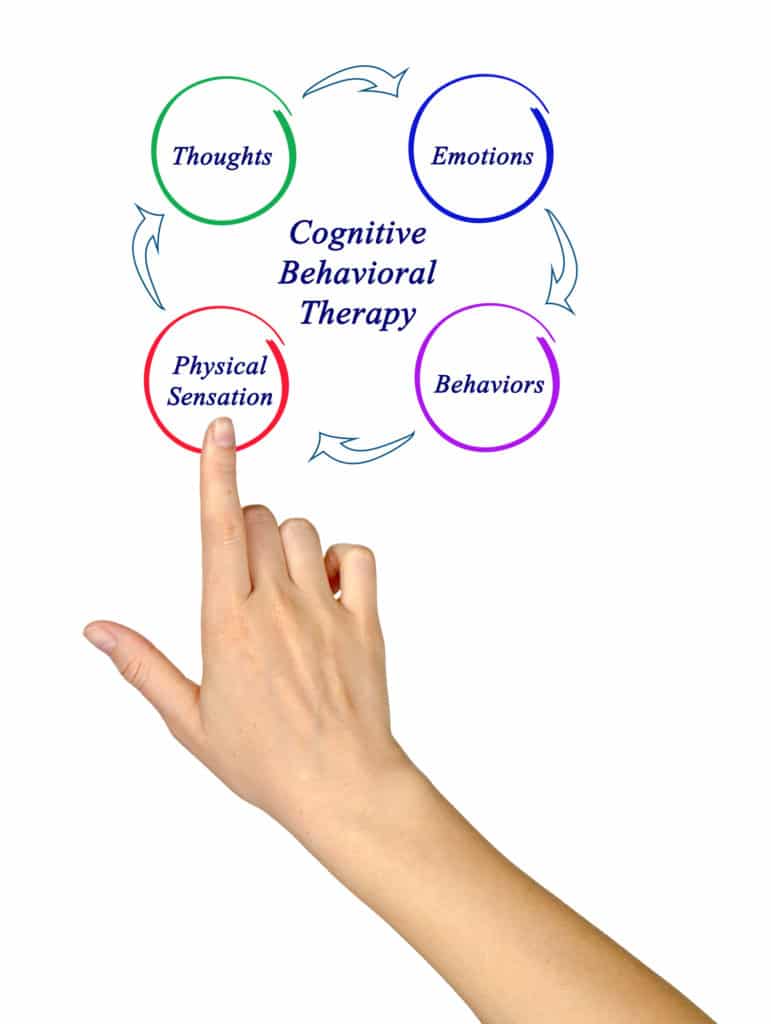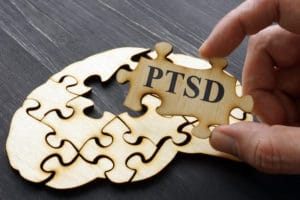Cognitive Behavioral Therapy Sets You Up For Long-Term Recovery From Addiction
About Cognitive Behavioral Therapy
Overcoming a drug addiction is a process that takes time and effort on the part of the addict and those that love them. A combination of therapy, including cognitive-behavioral therapy, and medication can be successful in dealing with most drug addictions when the addict is fully committed to changing. Here at Wasatch Crest, our dual diagnosis approach heals both the body and the mind and paves the path to recovery from any substance.
What is cognitive-behavioral therapy?

Cognitive behavioral therapy is used to change negative thinking patterns in order to stop the drug abuse cycle. While addiction is typically manifest in physical forms, most addicts have underlying, destructive mental patterns and habits that must be identified and changed before freedom from dependency can be obtained. Whether the drug of choice is alcohol, drugs, pornography, gambling or tobacco, cognitive therapy can be successful in changing patterns from destructive and dangerous to productive.
During cognitive therapy, our professionals work to break down the negative thinking cycle, and replace bad patterns with healthy, new behaviors that stop the addiction. In order for treatment to truly be successful, the addict and their loved ones must understand why the compulsion to use drugs is present.
Therapy can identify triggers – events that occur in everyday life that send the addict scrambling for their drug of choice. Once these triggers are identified, therapists are able to teach the addict and their loved ones how to deal with them appropriately and in a healthy manner rather than destructively.
Read what our patients are saying!
"This Treatment Center was my 3rd inpatient Rehab. I walked from 2 others before going to Wasatch. I stayed do to the Staff and clients that were there. Jordan was a wonderful and caring therapist. And the rest of the staff were respectful and accommodating while I stayed there. The down side is I didn't feel that there was enough 12 step meeting to attend, and the center itself is getting run down. I'd recommend this rehab to my own friends and family."
Benefits of Cognitive Behavioral Therapy

Here at Wasatch Crest, we recognize that treatment must be customized for each patient, and that therapy has many benefits that can make or break a treatment program. Some of the immediate benefits of cognitive therapy include:
- Support network – In order for any addict to overcome destructive behaviors, a support network is crucial. During the recovery process, the patient must have people to depend on when they are weak. Therapists can aid a patient when relapse is likely by offering encouragement and support.
- Thought patterns – Many patients struggle with negative thought patterns that result in risky behaviors like drug abuse. When life is bleak and stressful, an addict may turn to their substance of choice in order to deal. With cognitive therapy, they develop positive thinking patterns that allow them to deal with everyday stressful situations.
- Increased self-esteem – Low self-esteem is a common factor in those who abuse drugs or other substances. With regular therapy, self-esteem is increased and positive self-worth is reinforced on a regular basis in order to prove to the patient that he or she deserves a better life free from dependency.
- Resistance to peer pressure – Most addicts have a network of people that enable them to get drugs or alcohol. In order to successfully beat an addiction, they must be able to resist the pressure that comes from those they associate with. Therapy allows the patient to deal with situations they may face before they must deal with them in reality.
- Cost effective – Cognitive behavioral therapy can be performed on an outpatient basis, lessening the cost for those who can’t afford inpatient care.
- Baby steps – Most addiction programs involve small steps that lead to a great change. Programs that claim to work quickly aren’t likely to be successful, and regular therapy helps patients stay on the correct path.
- Normal activity – With outpatient cognitive behavioral therapy, the patient is able to keep a job and maintain regular activity levels in order to keep living life as normal as possible.
- Gradual end – With behavioral therapy, patients are slowly weaned off treatment when they are ready, rather than an abrupt end that can disrupt progress. Therapy may be cut back as the patient shows they are ready.
Combined with the required medication and other treatments, behavioral therapy can be a powerful tool in the fight against drug abuse and addiction.
What’s involved in cognitive therapy?
Cognitive therapy is a common type of talk therapy, psychotherapy. Patients work with a mental health counselor in a structured way, attending a limited number of sessions. Cognitive-behavioral therapy helps the patient become aware of inaccurate or negative ways of thinking, so they can view challenging situations more clearly and respond to them in a more productive, effective way. This approach focuses on present circumstances and emotions, rather than focusing on the patient’s childhood.
There are typically a series of steps involved with cognitive therapy.
How many sessions are needed?
There is no set timeframe for cognitive behavioral therapy, but it can have effective results in a brief period of time. At Wasatch Crest, we generally look for results to occur in from 5 to 20 sessions. Because of these relatively fast results, cognitive behavioral therapy is considered short-term therapy.
What are the steps of cognitive behavioral therapy?
At Wasatch Crest, we use cognitive behavioral therapy to focus on specific problems with a goal-oriented approach. These treatments progress through these steps:
- Identify troubling situations or conditions in the patient’s life — Since our focus at Wasatch Crest is an addiction, this first step will usually involve issues surrounding it. Here we’ll look to decide what problems and goals the patient would like to focus upon.
- Become aware of thoughts, emotions, and beliefs about these problems — Now we’ll encourage the patient to share his thoughts about addiction. This may include observing how the patient talks to himself, how he interprets the meaning of different situations, along with beliefs the patient has about himself, other people, and events. We may suggest the patient keep a journal.
- Identify negative or inaccurate thinking — Now we seek to help the patient identify the patterns of thinking and behavior that are contributing to the entire situation. We want the patient to focus on his physical, emotional, and behavioral responses to different situations.
- Reshape negative or inaccurate thinking — At this point, we want the patient to ask himself if this train of thinking and his view of a situation is based on fact or on an inaccurate perception of what is actually happening. Patients often have long-standing patterns of thinking about their lives and themselves, and it can be challenging to help them see the negative lines of thinking and acting. Once the patient sees the inaccuracies and negativity, we practice ways to change those thinking and behavioral patterns into positive new directions. The goal is to make these new patterns the habit of moving forward.
How are results determined?
This approach with our Wasatch Crest patients, as with all counseling and therapy, doesn’t have cut and dried finishes and “results.” The goal with this method of treatment is to give the patient the power to cope with the reasons he turned to alcohol or drugs, to alter the ways he looks at those reasons, and to feel as if he can change these mindsets, along with the path of his life, moving forward.
What conditions can cognitive-behavioral therapy treat?
At Wasatch Crest, we use cognitive behavioral therapy to address addiction in our patients. But this form of therapy can be used in a wide variety of mental health disorders:
- Substance use disorders
- Depression
- Anxiety disorders
- Phobias
- PTSD
- Sleep disorders
- Eating disorders
- Obsessive-compulsive disorder
- Bipolar disorders
- Schizophrenia
- Sexual disorders

Who is a candidate for cognitive therapy?
Cognitive behavioral therapy can be used as a short-term treatment to help individuals learn to focus on present thoughts and beliefs. CBT can be used to treat a wide range of conditions including:
- Addiction
- Anger issues
- Anxiety
- Bipolar disorder
- Depression
- Eating disorders
- Panic attacks
- Personality disorders
- Phobias
How effective is cognitive therapy?
Originally developed in the 1960s as a response to the limitations of other therapy approaches, cognitive therapy addressed how thoughts and feelings affect behaviors. Since those early days, CBT has been one of the most studied forms of treatment. The reason CBT has been one of the most researched types of therapy is, in part, because treatment is focused on highly specific goals and results can be measured relatively easily. Here are some of those findings:
- CBT has a high level of empirical support for the treatment of substance use disorders, helping improve self-control, avoid triggers, and develop coping mechanisms for daily stressors.
- CBT is the leading evidence-based treatment for eating disorders.
- CBT has proven helpful in those with insomnia as well as those who have a general medical condition that interferes with sleep, including those afflicted with pain or mood disorders such as depression.
- CBT has been scientifically proven to be effective in treating symptoms of depression and anxiety in children and adolescents, as well as adults.
- A meta-analysis of 41 studies found that CBT helped to improve symptoms in people with anxiety and anxiety-related disorders, including obsessive-compulsive disorder and post-traumatic stress disorder.
Are there any limitations to cognitive therapy?
Although we’ve found cognitive behavioral therapy very effective for our Wasatch Crest clients, that doesn’t mean it is a perfect match for everyone. These are some of the challenges with this therapy approach:

- Change isn’t a given — In the early phases of treatment patients may understand that certain thoughts they are having are not rational or healthy, but despite that understanding it doesn’t make it easy to alter those thought patterns.
- Structure is key — Cognitive behavioral therapy is structured. It doesn’t tend to focus on underlying unconscious resistances to change as much as other methods, such as psychotherapy. CBT works best for patients who are more comfortable with a structured and focused approach in which the therapist often takes an instructional role.
- The patient must be willing — For CBT to be effective, the individual must be ready and willing to spend time and effort analyzing their thoughts and feelings. Such self-analysis and homework can be difficult, but it is highly enlightening to learn how internal states impact outward behavior.
- Progress is in steps — CBT is a gradual process with the patient making incremental steps toward a change in behavior. By progressively working toward a larger goal, the process seems less daunting and the goals easier to achieve.
Is cognitive behavioral therapy different when used in children versus adults?
There isn’t any difference in treatment methods other than simply acknowledging the differences between the areas of understanding of children and adults. For CBT to work, children need to understand their thought patterns. Some children can do this when they are just 6 or 7 years old. Others don’t have the ability until they are older.
How often can cognitive therapy sessions be given?
Cognitive behavioral therapy is a common type of talk therapy. It is generally considered to be “short-term therapy,” ranging from about five to 20 sessions. As you would assume, the number of sessions can vary widely depending on the individual.
One-on-one and group therapy sessions
This therapy can be done one-on-one, in groups with family members, or in groups with people who have similar issues.
How we can help
Here at Wasatch Crest, we take a unique, dual approach to drug addiction and rehab. Our goal is to ensure the well-being and happiness of our patients and their loved ones by healing the mind and the body. With our treatment programs, patients get the help they need to overcome destructive thinking patterns that lead to drug abuse.
If you or someone you love struggle with drug addiction and may benefit from therapy, contact us at 435-657-9755 to learn more.
